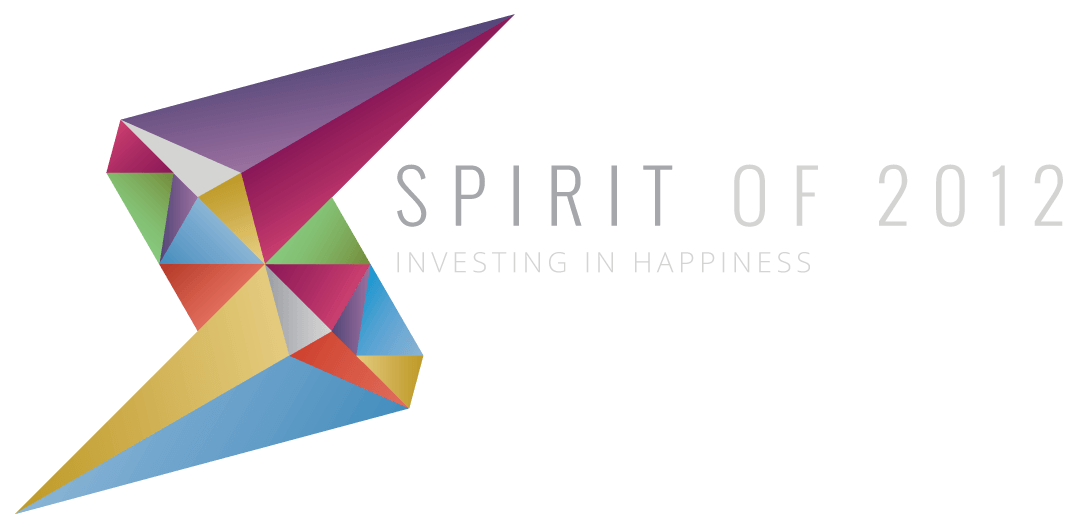Everyone can write a song: reflections on the Carers’ Music Fund
Downloads

About the fund
Since March 2019, we have been part of the learning partnership for the Spirit of 2012 Carers’ Music Fund, alongside programme evaluators Apteligen, Carers UK, and the Behavioural Insights Team. We worked together to ensure that a wellbeing lens was used to plan the design, delivery and evaluation of the Fund, as well as to support the projects in their learning.
The Carers’ Music Fund has been made possible by funding that Spirit of 2012 received from the Tampon Tax Fund, awarded through the Department for Digital, Culture, Media and Sport (DCMS).
The programme supported participatory music-making interventions aimed at improving the wellbeing and loneliness of female carers who are particularly vulnerable to low wellbeing and social isolation. As the 2-year fund comes to an end, we look at some of the key insights from our partnership working and findings from the programme-level evaluation.
Take a look at our previous insight reports on the Carers’ Music Fund:
A wellbeing-focused fund
As a programme that is strongly committed to generating wellbeing impacts across the UK, the Carers’ Music Fund supported 10 projects whose approach is grounded in the latest wellbeing research. Between March 2019 and June 2021, grantees were encouraged to design, deliver, and evaluate their activities using the growing evidence base on the wellbeing benefits of music and singing interventions. Funding was given to projects that showed a commitment to test and learn different pathways to wellbeing, and to share their learning with others.
As a What Works Centre, we are keen to promote learning and ensure that wellbeing evidence reaches decision makers in an accessible, relevant, and credible way. Using a wellbeing “lens” to track improvements in people’s lives often highlights complex problems that mirror the multiple drivers and dimensions of wellbeing, which encompass everything from the environmental factors that affect us, to the experiences we have throughout our lives. This is why we were proud to work within the programme learning partnership to develop a wellbeing-informed approach to generate useful evidence and shape recommendations for policy and practice.
The Learning Partnership and the Test and Learn approach
The programme evaluation was designed to gather evidence on the wellbeing outcomes and impact generated by Carers’ Music Fund projects. A theory-based framework was adopted which helped evaluators uncover some of the causal pathways to wellbeing improvements for female carers. Through the learning partnership, Spirit of 2012 ensured that the Fund’s work was informed by a coherent and common approach to wellbeing measurement. The use of well-established metrics for wellbeing and loneliness allows funds such as Spirit of 2012 to compare the wellbeing impacts of their grant-making activities with other wellbeing funds, programmes and pilots, and to benchmark progress against the national picture.
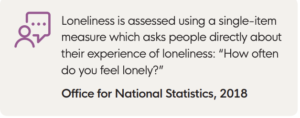
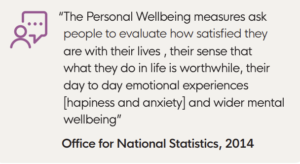
The Carers’ Music Fund was characterised by a ‘test and learn’ approach which encouraged projects to work iteratively by delivering “terms” of weekly music-making sessions to four different cohorts of women and girls. The approach was about flexibility and refining engagement and delivery strategies throughout the course of the programme. Grantees were encouraged to reflect on wellbeing inequality among their different cohorts to promote learning on what works for groups with different personal circumstances and experiences.
By April 2020, Carers’ Music Fund projects had begun to deliver most of their activities online, to work with a broader group of carers and in some cases, to provide wrap-around pastoral support in response to the additional needs created by the pandemic and lockdown policies. The Fund’s projects rose to these challenges, using the peer support offered at Carers’ Music Fund learning days to share knowledge of the emerging needs of participants during the pandemic and successful strategies to meet the changing demands of digital delivery.
Programme evaluation
The programme evaluation published today presents findings on the effectiveness of 10 music-making and singing interventions delivered to more than 700 female carers across the UK between September 2019 and June 2021.
The mixed-method evaluation combines quantitative and qualitative data to explore the effects of project activities on the wellbeing, loneliness and social connectedness of beneficiaries. Outcomes survey data was collected at the start and end of the projects for over 200 beneficiaries and has been analysed alongside insights from focus groups and interviews. As a result, the report paints a fuller picture of the causal mechanisms at the heart of the Fund’s wellbeing outcomes.
Targeting people with low wellbeing
One important finding was that the Carers’ Music Fund project successfully targeted groups with low wellbeing, as beneficiaries reported lower average wellbeing scores when they first engaged with the projects, compared to the yearly population-level average estimates for the same period.
The Fund’s test-and-learn element encouraged organisations to target a wide cross-section of carers, which included young and new mothers, recently arrived refugee groups and women living in rural communities. The Fund took a broad definition of ‘carer’ that went beyond that used in statutory services, so that carers didn’t need to be officially recognised to take part and benefit.
Among these groups of carers, young adults and full-time carers were more likely to report poorer wellbeing across the ONS4 domains. Roughly two thirds of the carers engaged were not in paid employment while just over one third claimed to have a long-term physical or mental health condition or illness. Within the broader wellbeing evidence base, poor mental health and unemployment are among the likely drivers of low wellbeing
The effects of Covid-19 on carers
The wellbeing of carers recruited after March 2020 was compounded by the effects of the coronavirus pandemic, which increased the overall burden of care as local services were reduced or cut, delays in NHS treatment and growing financial pressures worsened feelings of stress, social isolation and overall wellbeing (Carers UK, 2020).
The data on loneliness and social isolation collected at the start of the projects paints a similar picture, with 13% of beneficiaries sampled claiming they felt lonely “often or always”, almost double the national UK average for 2020/2021 (7.2%)2
Wellbeing outcomes
Evaluation findings from eight projects show that by the end of the programme, the average wellbeing scores of CMF beneficiaries across cohorts had improved for each of the four ONS personal wellbeing measures: life satisfaction, sense of worthwhile, happiness and anxiety. Life satisfaction showed the greatest positive change while smaller improvements were recorded for beneficiaries who were recruited after the start of the Covid-19 pandemic, postMarch 2020.
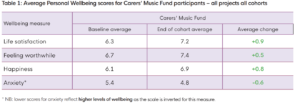
The distribution of loneliness scores across the projects shows a slight reduction in the number of beneficiaries who are very lonely between the start and end of the programme (n=30 and n=21, respectively).

A closer look at the data suggests that the largest reductions in loneliness were for people aged 16 and over, those who were involved in a Carers’ Music Fund project prior to the pandemic, and full-time carers. From March 2020 onwards, data on the contribution of CMF projects to reported changes in wellbeing and loneliness was increasingly difficult to interpret in light of the broader social and psychological effects of the Covid-19 pandemic. The wealth of data that now exists on wellbeing, loneliness and the pandemic, alongside the qualitative insights from the CMF programme evaluation provide initial insights into the contribution of programme activities.
Pathways to wellbeing
The evaluation’s theory-based framework has generated important insights into some of the different ways that music-making activities can lead to wellbeing improvements. Focus groups and in-depth interviews were used to build a Theory of Change showing the potential mechanisms that enable improvements in wellbeing, social connectedness and reduced loneliness in the longer-term.
Figure 2 below was developed following Theory of Change workshops run by the Behavioural Insights Team and with input from Apteligen and our Centre. For participating carers, personal wellbeing, social connections and loneliness are thought to improve once a series of core outcomes are achieved. As carers progress through a 12- week programme of activities, project mechanisms become enablers of positive change and lead to improved levels of wellbeing, reduced loneliness and an improvement in social connections and relationships in the longer-term.
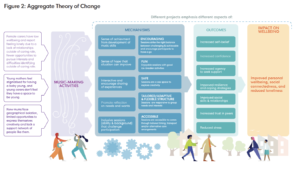
The programme evaluation used this Theory of Change as a starting point to explore some of the causal mechanisms at the heart of wellbeing changes generated by participation in the Carers’ Music Fund projects.
They analysed content from the partnership learning sessions, creative outputs from the projects – including song lyrics written by carers, recordings and film productions – and conducted a series of interviews with session leaders and participants. This qualitative data helped shed light on the building blocks and key ingredients in music-making and singing interventions that enable wellbeing and loneliness to improve (Figure 2).
To begin with, there were some important prerequisites, or building blocks, that were needed to begin the pathways to improved wellbeing:
- High quality music leaders and session facilitators emerged as key factors that create environments which stimulate creativity and make carers with different learning needs feel comfortable to learn new skills.
- When music-making is made accessible and fun, beneficiaries could more easily overcome issues around confidence and self-esteem, and it enabled people to connect. Projects that were well-planned and used a range of materials including online tools, and facilitators that set clear expectations were highly valued across interviewed projects.
- Finally, the evidence gathered suggests that having a pre-existing interest in music, a desire to learn or to connect with other people are enablers of change.
The key ingredients in maximising these building blocks came out clearly from the qualitative data:
- Carers benefited from a focus on learning and developing new skills, as well as collectively working towards a common goal – like a song or performance. These helped provide a structure and focus in the uncertain times of Covid-19.
- The music needed to reflect the lives of carers, and enable them to express themselves creatively and voice their experience. Carers needed to feel valued and appreciated, and that their voices were being heard.
- Social connection was essential, but it had to be blended with personal support in the sessions and beyond. Carers formed strong bonds with each other and the project staff, which often continued after the end of the sessions.
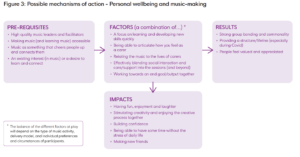
Conclusion
As the UK deals with the long-lasting effects of the Covid-19 pandemic, our understanding of how to help support wellbeing will be crucial for recovery planning.
Emerging evidence from the last eighteen months, including by Carers UK, points to significant health, social and economic impacts of the pandemic on carers. Carers provided more care, received less relief, and felt increasingly stressed, isolated and overwhelmed.
For many people these effects will last beyond the end of social distancing restrictions, and will be compounded by the fallout of the pandemic over the coming months and years.
In this context, data from programmes like the Carers’ Music Fund is a valuable asset to help us understand what works to improve our wellbeing, including how and why music-making activities can mitigate the effects of the pandemic for people with low wellbeing.
Partnership working has also been a key part of the Carers’ Music Fund – both in terms of delivery, as carer support organisations worked with music specialists, and within the learning partnership itself, which brought together different types of expertise. Programmes that adopt a test and learn approach, like this one, can support flexible delivery and encourage projects to adapt as they begin to learn what works in their specific contexts.
One important finding from the Fund evaluation is that music-making can lead to wellbeing through a range of different pathways. From building connections, to improving confidence and skills, giving carers a voice, and busting stereotypes – there wasn’t a single route to wellbeing, but a number of different journeys. These findings will be key when designing positive and creative opportunities for people in the coming months and years.
Above all it will be crucial in the Covid-19 recovery period to keep our eye on wellbeing as the outcome we should aim for. The pandemic has shown that those at risk of low wellbeing have struggled and will likely continue to do so in the future. The Carers’ Music Fund has shown that by using the evidence to design activities, and adapting those activities as we learn what works, can make a real difference to people’s lives.
Downloads
You may also wish to read the blog article on this document.
Downloads
You may also wish to read the blog article on this document.
![]()
[gravityform id=1 title=true description=true ajax=true tabindex=49]

